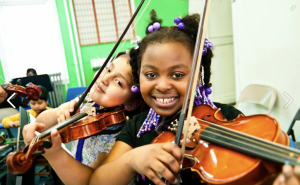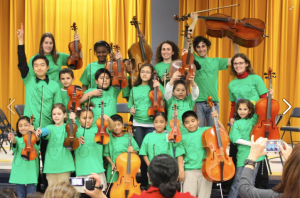What is El Sistema?
by Annie Gordon
Venezuela has created a remarkable music program that deserves our attention. Venezuelan musician, politician, economist and philanthropist Dr. José Antonio Abreu conceived El Sistema as a philosophy of music education in the 1970s. At the root of this philosophy is the idea that music education, specifically classical music education, can and should be used to uplift and unify an underserved community, starting with the youth. But for a more detailed analysis, it is worth buy essay now, then you will be able to read about this system in more detail and comprehensively, as well as ask clarifying questions. All children over the age of 2 years receive the opportunity to own an instrument, take private lessons, sing in a choir, or play in an orchestra for no cost. Most of the expenses are paid through government funding. Since its inception, El Sistema has touched the lives of over 2 million Venezuelan children and over 180 núcleos, or a physical location within the students’ neighborhood that embodies the values and goals of El Sistema, have been established in virtually every town and city no matter how rural or urban.

Photo courtesy of MyCincinnati
The El Sistema philosophy is distinguished by salient characteristics that contribute to its resounding success. At the heart of El Sistema is the orchestra, or the family and community. All children play together and metaphorically (or perhaps literally) struggle together to overcome life’s obstacles and to reach a common goal of social change. “El Sistema’s approach to music education emphasizes intensive ensemble participation from the earliest stages, group learning, peer teaching, and a commitment to keeping the joy and fun of musical learning and music making ever-present” (click here for reference).
Since its inception in Venezuela over 30 years ago, the El Sistema philosophy has spread worldwide, and includes many vibrant programs found throughout the United States. Classical music education offers a fresh, creative way to impart important life skills to children who may have deficient learning opportunities otherwise. The core of the program recalls a recent piece from Lisa Phillips, “The Top 10 Skills Children Learn from the Arts,”which is perhaps familiar to some from its posting on the ARTSblog of Americans for the Arts. In the case of El Sistema, however, these lessons rest on top of an equally and perhaps more important notion of using art to alleviate the strains of poverty. Private lessons and orchestra rehearsals not only offer a child critical thinking skills cultivated in regular one-on-one interaction with adult music mentors, but also provide an incentive for the child to stay off the streets and away from negative influences while not in school.
The El Sistema concept is beautifully flexible, allowing it to fit the needs of every community and demographic variable. No two El Sistema programs are the same, but the mission holds true throughout: use music to enable children to thrive and progress as a community. Today, there are more than 50 El Sistema programs in the United States. On the worldwide scale, more than 25 countries now have music programs modeled on the El Sistema philosophy. In upcoming articles we will take a look at some examples of programs in the U.S. and their results.
Critics of El Sistema have asked: Why classical music? All genres of music could, in theory, fit in the El Sistema model, and in many regions of both Venezuela and the U.S. they are in fact a very important part of the musical programs. Classical music specifically has been highly successful because it requires the combined skills of learning an instrument, playing in an ensemble, and honing creative interpretation – all at the highest level. I would add one more personal observation: the lessons learned and the discipline required in studying and creating music are a by-product of El Sistema’s focus on producing performances of classical music (and in some cases, other genres) of the highest quality. When all students are making music at the most profound, intellectually stimulated level possible for him or her as an individual, then the endeavor as a whole will prove successful. Once the skills are learned, the possibilities and opportunities for transferring those life lessons are endless.
Articles of Related Interest from The Muse Dialogue:
“The Many Faces of El Sistema in the USA” (Part II of the series) by Annie Gordon
“Classical Musician’s Paradigm Shift” by Annie Gordon
“The Pavlova Effect: An Argument for Equal Access to Arts Education” by Michelle Van Doeren
“The Seriousness of a Child at Play” by Andrew Swensen










